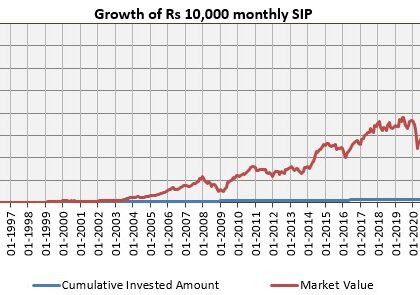A Systematic Investment Plan(SIP)is a mode of investment offered by mutual funds. Using this method an investor can put in a fixed amount of money at predefined intervals in a chosen mutual fund scheme. An SIP can be done in any mutual fund scheme-equity, hybrid, gold, international or debt fund. Sip help in investing regularly without worrying about the ups and down of the market. In the long run, investors stand to benefit due to rupee cost averaging and the power of compounding.
WHAT DOES ONE NEED TO START AN SIP?
Investors need to identify a fund in which they need to start an SIP based on their needs and goals. Investors need to be KYC compliant and to register a SIP they can connect with the advisor. At the time of registering the SIP an investor can decide the amount and date on which it is to be hit.
WHAT RETURNS CAN ONE EXPECT FROM A MUTUAL FUND SIP?
As per data from value research, over a 10-year period, large cap funds have returned an average of 13.36%. However, there is no guarantee or assurance of returns by investing in a SIP. This is because a mutual fund scheme invests in a basket of securities in different proportions. For example, a large cap fund could have 30-40 stocks in its portfolio. The price of these stocks could move up or down depending upon a number of factors and the return to an investor in a scheme is a function of this.
WHAT TIME FRAME SHOULD ONE OPT FOR WHILE DOING AN SIP?
Most fund houses mandate a minimum time frame of 6 months for an SIP. However, financial planners believe SIP in equity funds should be done for a minimum of 5 years to reap its benefits. While investor can choose period as per his requirement. They can also opt for the perpetual option, which means the SIP will continue till the investor gives an instruction to the fund house to close it.
CAN SIPS BE USED TO MEET GOALS LIKE BUYING A CAR OR A HOUSE OR FOR RETIREMENT?
Financial planners believe investors can meet their long term goals which are more than 5 years away by investing using equity SIPs. Since equities are known to give higher returns than other asset classes like debt or gold, investors can work back-wards and calculate the amount they need to invest every month to meet their goal. For example, an investor putting in Rs. 10,000 for a month in an equity SIP for 10 years can accumulate a corpus of Rs.23.23 Lakh, assuming a return of 12%.WHAT IS SIP (ARTICLE No.15)

